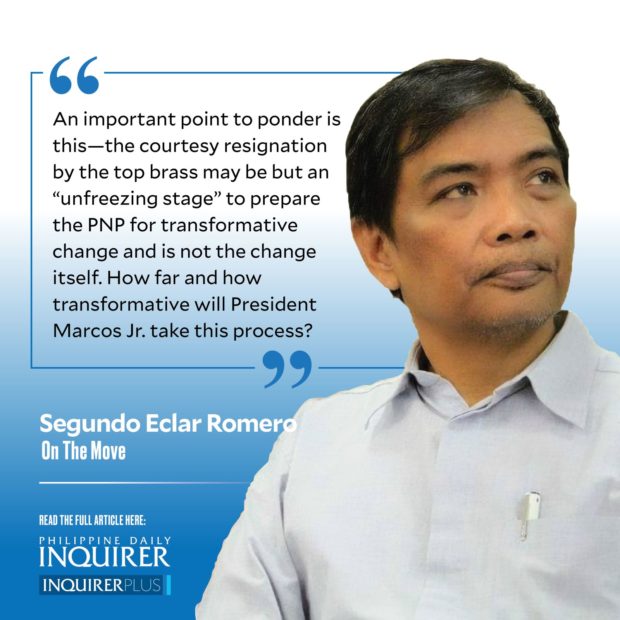Courtesy resignations: ‘Unfreezing process’?
 Department of the Interior and Local Government (DILG) Secretary Benhur Abalos made an emotional televised appeal to the Philippine National Police top brass to submit their courtesy resignation from the service. The appeal was directed to 657 police colonels and generals, comprising 0.03 percent of the 200,000 police force.
Department of the Interior and Local Government (DILG) Secretary Benhur Abalos made an emotional televised appeal to the Philippine National Police top brass to submit their courtesy resignation from the service. The appeal was directed to 657 police colonels and generals, comprising 0.03 percent of the 200,000 police force.
Clearly, Abalos is treating the PNP problem as a systemic, institutional problem, and the appeal for courtesy resignations is a bold decision to go for major surgery. A five-person committee of incontrovertible integrity will vet the courtesy resignations and recommend which among them the President should accept based on the records of the officers.
For their security, the identity of the commissioners has not been revealed, but to establish they are worthy to pass judgment, Abalos has identified Baguio Mayor Benjamin Magalong as one of them. Magalong is a much-admired local chief executive who had served over 38 years with distinction in the Philippine Constabulary and the Philippine National Police, in crucial posts such as head of the Criminal Investigation and Detection Group, and the Directorate for Investigation and Detective Management.
Now that this courtesy resignation action and process has become public, it will be subject to intense pressure and negotiation among stakeholders. Excising the PNP of the errant generals and colonels may or may not happen. The result may lean toward speedy and effective action, or toward regard for due process.
The courtesy resignation process is a courageous and welcome move by the Marcos Jr. administration. What it does by way of ferreting out the few culprits is putting the whole PNP top brass, and by extension, the whole PNP under the microscope. Every general and colonel becomes a set of data points toward a review of the whole PNP.
If done properly, we should see the process include integrity assessment tools such as the statement of assets and liabilities or SALN, lifestyle checks, review of financial transactions, disposition of office gifts and benefits, command decisions, and leadership in the face of ethical dilemmas, and nature of influence relationships with persons and institutions in society.
What can go wrong with the courtesy resignation action is improvisation. The devil is in the process. It must engender public confidence in its effectiveness and fairness. Abalos, Azurin, and their reform team must review the relevant lessons learned and best practices in transformative police reform. A good starting point is the police reform undertaken under former president Fidel V. Ramos. Check with former DILG secretary Raffy Alunan who led the nine-person commission that steered the quiet early retirement of dozens of members of the PNP top brass.
A good strategic approach that took off by tackling police corruption is the case of Hong Kong’s Independent Commission Against Corruption (ICAC). The ICAC sees nothing wrong with an anonymous panel of prominent citizens that for them serves as a top-level ethical anchor for their radical anti-corruption actions.
This courtesy resignation maneuver poignantly acknowledges that the PNP has been victimized by the war on drugs that the Duterte administration foisted on the Filipino people. The “take no prisoners” strategy not only stretched and distorted the fabric of justice and human rights of drug suspects and the people; its recoil also tore the PNP from its already weak moorings as an ethical and professional organization.
Whether President Marcos Jr. intends it or not, the courtesy resignation maneuver is a subtle distancing and departure from the diabolic fictions, justifications, and prevarications that have made the Duterte war on drugs possible. The courtesy resignation action will be the end of the “Tatak Duterte” war on drugs. What might the “Tatak Marcos Jr.” war on drugs look like?
An important point to ponder is this—the courtesy resignation by the top brass may be but an “unfreezing stage” to prepare the PNP for transformative change and is not the change itself. How far and how transformative will Mr. Marcos take this process?
Hopefully, strategically, inclusively, and sustainably. May it be ironic that following in the wake of Duterte, this Marcos might yet cut a more humane profile. Perhaps all the excoriations the Marcoses have experienced since they were chased out of Malacañang may yet reappear like a pristine lotus emerging from a fetid pond.
doyromero@gmail.com




















